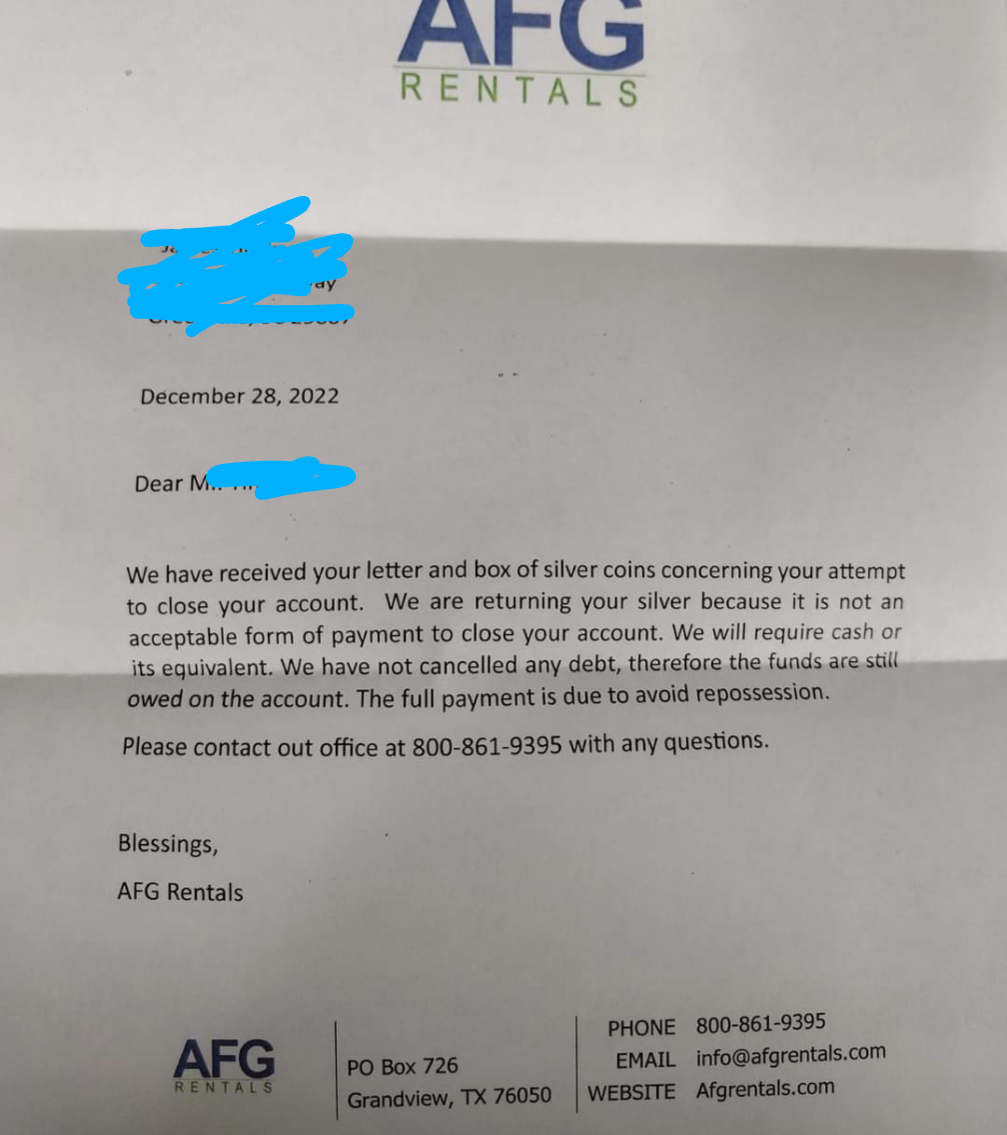
Refusing tendered payment immediately discharges debt…
I sent you 80 lbs of coconuts, if you can’t accept that then I don’t owe anything.
Thanks for reminding be of this classic gem
Refusing paper money to settle a debt should discharge the debt.
Even if it is $1 million debt paid in one dollar bills. Mainly because I admire the dedication on that
660oz of silver is worth a little under $16,000. I couldn’t imagine sending that much money through the mail
I bet if you broke open one of those coins he sent that it would be full of chocolate
Or it’s all high lead pewter. Which would explain lots of these guys thought processes.
It’s a small miracle it arrived intact twice.
Usually they just send quarters, not actual silver, at least from the ones I’ve seen when they post what they actually mailed.
This guy also claims to have paid his friend 20K in silver for a house.
this isn’t as insane as it sounds. bullion coins are legal tender with a lower face value than their commodity value.
so if that’s 20k face value it’s about average value for a house and they probably used the legal tender number for tax purposes.
But when it comes to paying 3rd parties like in the OP you’re better off just selling the silver and using the common currency … so no $2 bills
2 dollar bills are a real USD currency note. I think you meant 3 dollar bills
nope, people have been arrested or killed for trying to use 2 dollar bills before. it’s just best not to take that risk.
20k face value maybe on rounds worth $40 each
The picture seems to show actual silver coins with their various bond notes.
I think I would have applied the silver at face value. “Thanks for your 50 Morgan dollars. We have lowered your balance by $50.”
Ingots of silver can be rejected (not legal tender). But you are correct, US coinage is cash and is legal tender. For once, this is a scenario where that term actually applies. The poster owes a debt, and the legal tender must be accepted as payment.
However, since the poster offered the shipment as an offer for “payment in full”, such an offer is “all or nothing”. They cannot pick out the legal tender coinage and apply it to the debt while rejecting the rest of the shipment. It’s not different to how if I owe you a debt of $500, then offer you $50 in cash and a silver ingot as payment in full, you are not entitled to keep the $50 as partial payment while sending the ingot back. You are only able to accept my offer and absolve the debt or reject it and send everything back.
Your second paragraph is correct but the first one is not. An individual is not required to accept legal tender. The government is, but individuals can accept or reject any form of payment.
Not quite. Any seller can reject any form of payment at the point of sale. But, after a contract has been established, private parties are required to accept U.S. currency as a form of payment.
Hence the words printed on paper money: “THIS NOTE IS LEGAL TENDER FOR ALL DEBTS, PUBLIC AND PRIVATE.”
The case Marbury v. Madison (1803) established the power of Congress to declare legal tender. However, it also clarified that this power doesn’t compel private entities to accept it for all transactions.
I’m not talking about a transaction like in a grocery store. I’m taking about contracts. Under contract law, a debt paid in US currency is considered fulfillment of the contract.
Individuals are required to accept legal tender. If they refuse payment by legal tender then they get nothing. The debt is absolved by the act of offering (tendering) payment through legal tender. This is why Federal Reserve Notes have “This note is legal tender for all debts, public and private”.
Edit: They are required to accept it for debts. They are not required to accept it as payment for goods and services when a debt has not been incurred. For example, a coffee shop isn’t required to accept cash and can choose to only accept credit card payments.
We refused cash as a mortgage company.
That is legally impermissible. It’s just that nobody bothered to take your employer to court over it. But if someone sends cash, your employer is legally obligated to accept it. If your employer sues someone for non-payment or tries to foreclose and the debtor offers payment in physical cash, it cannot be refused.
We got away with it ≠ it was legal
Section 31 U.S.C. 5103 states that US currency is legal tender for “all debts, public charges, taxes, and dues.” This means businesses must accept cash for these specific purposes, but not necessarily for all transactions, including mortgage payments.
Are you arguing that a mortgage is not a debt??
“Blessings”? Who closes a professional letter like that?
Maybe it’s just a nicer way of saying “Bless your heart”.
Fair 😂
Seems to be located in Texas.
Is this typical there?
They are pretty religious.
I wonder what the reasoning is to send 15 thousand dollars worth of silver instead of just sending 15k directly.
Any transaction in legal tender recognized by the state is an admission of residence and/or citizenship of said state and thus a subject to its law must adhere to any and all demands, and I ain’t no state’s bitch.
So by sovcit logic I can go to any eu country and buy a bowl of spaghootles with euros and I’m now a european.
Seems like that would simplify immigration
Username checks out.
If he gave up $15,180 in silver (based on spot price of $23 per ounce, spot changes minute to minute based on many factors such as worldwide demand), it means that he actually owes the rental people $15,108,000. This is a rare unicorn, this solvent silver sovvy, and this is his version of taping $3.00 of junk silver to a letter to the gas company. If I were the creditor, I would test the silver bullion or rounds with an acid kit and then accept it as a partial payment, if genuine. This unicorn might be the only sovvy ever to actually offer anything fungible to pay off a debt. They could take him to court for the rest, but that slot machine of crazy only pays out once. Write it off as bad debt for tax purposes.
Why do you think he owes 10x? He could just owe 15k and actually he trying to pay it off. That is what I don’t get.
I don’t get it, 660 ounces of silver is 15k, why didn’t they just sell their silver and pay off their debt?
Because then it wouldn’t be batshit crazy.
“Blessings” lol
Toodles,
The People You Still Owe Money To
That’s quite a corporate sign off.
How much do they owe??
He did not say but given sovcits usually send one whole silver coin when they try this, must be a lot.
But wait…. I was to understand that any debt could be canceled by presenting a single silver coin of any size or weight… obviously the mistake was sending too many, thus invalidating the 1099a.
SMH I should sell tiny silver coins to these people.
Did they watch John Wick, and think that’s how it actually works?
You’d probably make lots of fake money from them
can’t bro just sell the silver and pay them? why the extra hassle?
Sovcits make everything hard.
Silver is magic (see werewolf and vampire lore) and so it’s real value is approximately 1000 times greater than the face value or going market value for the same coin. It can’t be evenly traded for money, only for buying goods and reimbursing debts. That’s why you can buy a house for only 10 silver coins (as long as you have 2 witnesses and 2 recording secretaries). Honestly, this guy over paid.
I don’t know how much they owed, but I just check the price of silver–$23.34 oz–so the 660 oz would be $1504.40.
I can’t see anybody taking hard metal as a payment though.
$15,180, roughly, based only on spot. Some of those MIGHT be collector’s items worth more, as I can see some of the rounds are in capsules/plastic sleeves. It depends on condition and sometimes it’s worth it to have something that might be rare or unusual graded by a coin valuation company. Usually, it’s not worth the fees.
Silver coins aren’t worth much to collectors, specifically because they’re so easy to get for collectors. The supply is huge, the demand tiny, and they basically never break because nobody is using them.
You’re off by a decimal place.







